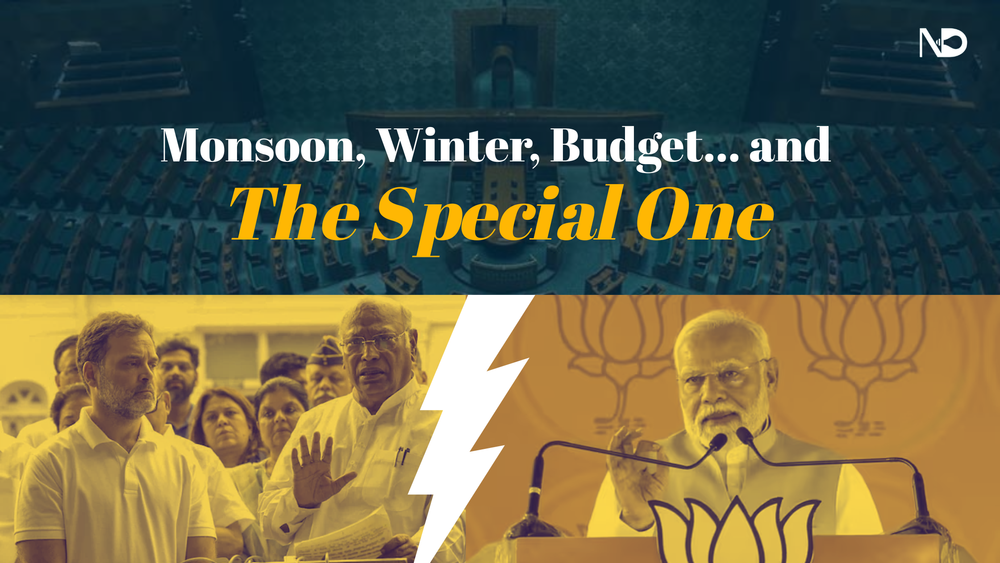Monsoon, Winter, Budget... and The Special One
The college timetable is more or less predictable. Except free hours on a Friday afternoon that are not to be trusted - professors do love seizing the opportunity to schedule a special class.
The Indian Parliament operates on a schedule too, Monsoon, Winter and Budget Sessions. We know the Monsoon Session, 21st July 2025 onwards is routine, but what aren't, special sessions. Some of them make history, some of them make headlines, and this time, just a demand for a Special Session on Operation Sindoor had over 200+ MPs writing to the PM who within his parliamentary rights chose not to entertain it.
The government chose to wait for the Monsoon Session. Why? Because it could.
Special sessions can happen any time on any given day. They can be called by the government in power for emergencies, reforms, celebratory events or moments of national significance.
India’s first special session was held at midnight on August 15, 1947. Nehru’s iconic “Tryst with Destiny” speech marked the birth of a nation. Since then, there have been eight more. Some symbolic: celebrating Independence, Quit India, Ambedkar’s 125th birth anniversary, or inaugurating the new Parliament in 2023. Some reformative, like the midnight Special Session of 30th June, 2017 introduced GST, a major economic reform.The last Special Session, in fact, witnessed the passage of the historic Women’s Reservation Bill 2023.
Few were urgent, like in 1962, when Parliament met early during the Sino-Indian War. Interestingly, then, Atal Bihari Vajpayee, leader of the Jan Sangh, demanded a session to discuss the war losses and unexpected attack. Nehru, the then PM agreed, but the discussions exposed India’s military unpreparedness. In contrast, during the 1971 war with Pakistan, no special session was needed; the Parliament was already in its winter session. So there seems to be no clear ‘when or not to hold’ when it comes to special sessions.
Looking at it from constitutional and functionality lens, the Constitution does not explicitly define "special session” but Article 85(1) gives the President the power to summon the Parliament, as long as no more than six months pass between sessions. But it’s not as simple as a President’s summon! The Central government has the authority to call for a session. Then the Cabinet Committee on Parliamentary Affairs (CCPA) determines the agenda, date(s) and number of sittings. After the session schedule is finalised and approved by the President, the MPs are then called upon to convene for the special session.
Before 1999, proposals for summoning Parliament went through the CCPA, then to the PM and President. The process shifted; proposals began going directly to the Cabinet on the Home Minister's advice. Why? Because the CCPA consists of the cabinet members themselves.
There is sometimes an all-party meeting before the session to discuss the agenda, but guess what? This is only a convention, not a constitutional requirement. The control over the agenda, however, rests with the CCPA and central government. And often, the detailed agenda is circulated at the last minute and can come under criticism due to less time for opposition to prepare their talking points. Special Sessions do not follow the same democratic practices as regular sessions. There’s no Question Hour, no Zero Hour, and no Private Members' Business.
Their structure often limits participation, because special sessions serve better as a forum for declarations and open forum discussions over detailed planned deliberations unlike the 3 sessions . These special sessions are ‘special’, and while these sessions may appear ceremonial or responsive, they mainly operate on executive discretion and will.
As Parliament meets again for the Monsoon Session 2025, Operation Sindoor will remain a talking point. Perhaps the absence of a special session too, as 16 Parties demanded one.
Was it a missed opportunity, or did the government simply exercise its prerogative?
Written by Poorvi S.

